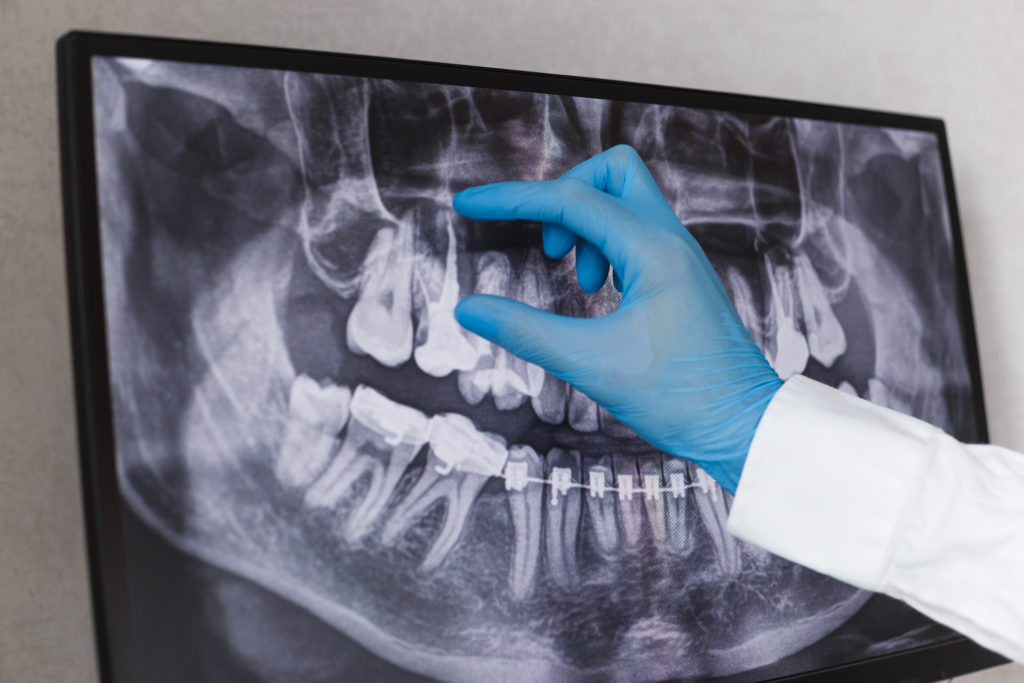When you go for your checkup at the dentist, one of the last things you want to hear is the words "root canal." Treating a root canal isn't very fun. After all, it takes some time and causes a bit of discomfort. Still, it's essential: ignoring a root canal issue can cause the problem to spread to other areas of the mouth, leading to serious dental problems and even other potential health problems. So, how do you know if you need a root canal? Find out the seven common warning signs that root canal therapy is in your future.
What Is a Root Canal?
First, it's important to understand what a root canal is. A root canal is a type of endodontic treatment — a treatment that works on the inside of the tooth. A root canal treatment aims to repair an extremely damaged or infected tooth in the hopes of avoiding tooth removal. The treatment is called a root "canal" because the process includes cleaning out inside the canals of the roots of the tooth.
A root canal is a fairly straightforward procedure. Your dentist will extract all the bacteria from the tooth pulp, nerve, and root. Then, the area is disinfected with antibiotics and the empty roots are filled. The last step is to close the area to prevent new decay.
What Parts of the Tooth Are Involved in a Root Canal?
The root canal focuses on the inside of the tooth. With this procedure, the damaged or infected tooth pulp from inside the crown and roots of the tooth is cleaned. After the cleaning, the canal is disinfected, filled, and sealed.

7 Signs You Need a Root Canal
Here are the seven most common signs that you may need a root canal.
- Persistent Pain
Your teeth shouldn't cause you constant pain. If you're finding that you're continuously in pain or the pain frequently bothers you, stops, and then returns, it could be a sign you need a root canal. Persistent pain can be due to a damaged root in your tooth.
Of course, persistent pain can also be due to other dental problems such as a cavity or a damaged filling. To address your tooth pain, see a dentist immediately — after all, no one wants to live with pain!
- Chipped or Cracked Teeth
When you chip or crack a tooth, it becomes more at risk for a root canal. The tooth is now "open," and bacteria can easily access the inside of the tooth, which can result in an infection. Alternatively, the tooth may have chipped or cracked in the first place because it's infected or decayed, which left it weak. Regardless, it's always a good idea to get a chipped or cracked tooth checked out by a dentist.
- Sensitivity to Heat and Cold
Believe it or not, your teeth aren't supposed to shock you with pain when you eat something cold or hot. If this happens, it could be a sign that the nerves in your teeth are damaged or infected. When your tooth's pulp chamber is infected, the nerves in the pulp chamber can overreact to heat or cold. Overreaction causes a sharp or dull pain that often lingers.
- Swollen Gums
Your gums are often a great indicator of your overall oral health. Healthy gums are firm and pink. If you notice a painful tooth has swollen gums surrounding it, this could mean you need a root canal. The swelling occurs from the acidic waste products of dead pulp tissues, and a root canal can help treat the tooth and decrease swelling in the gums.
- Tooth Discoloration
If the pulp of your tooth becomes infected, it can sometimes lead to your tooth turning a grayish-black color. A lack of blood supply to the tooth pulp can result in the breakdown of internal tissue, which might then be followed by discoloration.
Tooth discoloration doesn't always require a root canal and can instead be due to another dental problem. Regardless, you shouldn't ignore discolored teeth.
- Tooth Mobility
Tooth mobility is the medical term for a loose tooth. When a nerve is damaged, it can cause a tooth to become dislodged and feel looser. There are other reasons for tooth mobility, but root canal therapy may be necessary if you have a loose tooth.
- Deep Decay
Letting a cavity go for a long time without treatment can result in deep decay. Deep decay is when an infection has set so far into the tooth that regular oral hygiene care, or brushing and flossing, can't help. Once deep decay has set in, a root canal is often the only solution before the tooth has to be fitted with a crown.
Does a Root Canal Hurt?
Thanks to advances in modern medicine, root canals are often painless for patients. A dentist can use a combination of anesthetics and modern dental techniques, making the procedure as pain-free as possible. Patients might experience some discomfort in the tooth area for a few days post-treatment but over-the-counter pain medication can help.
Don't ignore the warning signs. If you think you might need a root canal, we recommend scheduling an appointment at one of our convenient locations.
FAQs
If you have mild symptoms, such as some slight tooth pain or sensitivity, it could mean that you just need a filling. But if you have moderate to extreme symptoms, such as tooth
discoloration, persistent tooth pain, or a loose tooth, it's far more likely you'll need a root canal. Ultimately, only a professional dentist can confirm what kind of treatment you need.
If you need a root canal, the only alternative is removing the infected tooth. According to the American Association of Endodontists, this isn't the best approach. Whenever possible, it's always best to try to save the natural tooth as an artificial tooth cannot fully replace the look or function of a natural tooth.
You might be nervous about your root canal therapy but rest assured, this is a straightforward procedure that your dentist performs regularly. There's little you need to or should do before your root canal. However, make sure you ask your dentist any questions you have so you know what to expect during and after the procedure.
No, an infected, damaged, or dying tooth cannot repair itself. Over time, the tooth will only worsen without treatment and can even spread damage to surrounding areas. Even if someone doesn't feel pain, an infected tooth should always get treated.
A root canal procedure can be performed by a regular dentist. In some cases, a more complicated case will need to be performed by an endodontist. An endodontist is a highly skilled dentist specializing in tooth pain and root canal procedures.
If an experienced dentist performs the root canal correctly, the results can last a lifetime.

